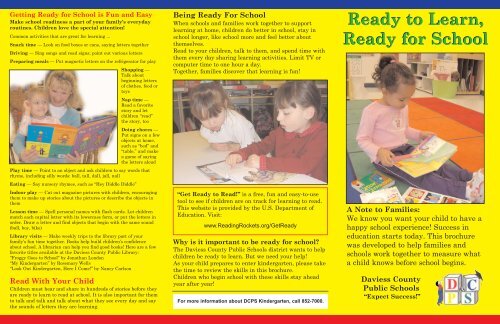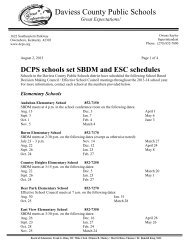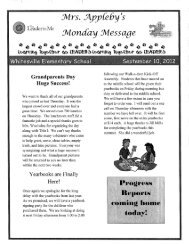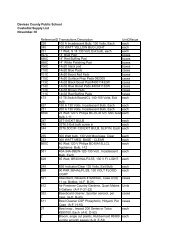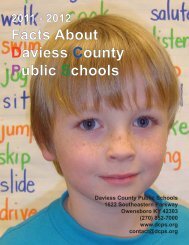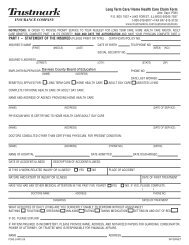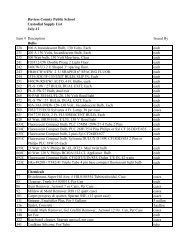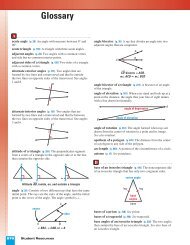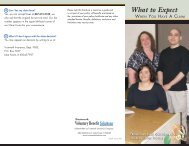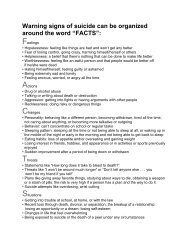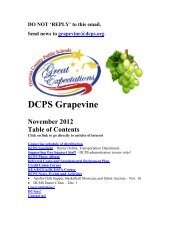DCPS Kindergarten Brochure - Daviess County Public Schools
DCPS Kindergarten Brochure - Daviess County Public Schools
DCPS Kindergarten Brochure - Daviess County Public Schools
Create successful ePaper yourself
Turn your PDF publications into a flip-book with our unique Google optimized e-Paper software.
Getting Ready for School is Fun and EasyMake school readiness a part of your family’s everydayroutines. Children love the special attention!Common activities that are great for learning ...Snack time — Look on food boxes or cans, saying letters togetherDriving — Sing songs and read signs; point out various lettersPreparing meals — Put magnetic letters on the refrigerator for playShopping —Talk aboutbeginning lettersof clothes, food ortoysNap time —Read a favoritestory and letchildren “read”the story, tooDoing chores —Put signs on a fewobjects at home,such as “bed” and“table,” and makea game of sayingthe letters aloudPlay time — Point to an object and ask children to say words thatrhyme, including silly words: ball, tall, dall, jall, nallEating — Say nursery rhymes, such as “Hey Diddle Diddle”Indoor play — Cut out magazine pictures with children, encouragingthem to make up stories about the pictures or describe the objects inthemLesson time — Spell personal names with flash cards. Let childrenmatch each capital letter with its lowercase form, or put the letters inorder. Draw a letter and find objects that begin with the same sound(ball, boy, bike)Library visits — Make weekly trips to the library part of yourfamily’s fun time together. Books help build children’s confidenceabout school. A librarian can help you find good books! Here are a fewfavorite titles available at the <strong>Daviess</strong> <strong>County</strong> <strong>Public</strong> Library:“Froggy Goes to School” by Jonathan London“My <strong>Kindergarten</strong>” by Rosemary Wells“Look Out <strong>Kindergarten</strong>, Here I Come!” by Nancy CarlsonRead With Your ChildChildren must hear and share in hundreds of stories before theyare ready to learn to read at school. It is also important for themto talk and talk and talk about what they see every day and saythe sounds of letters they are learning.Being Ready For SchoolWhen schools and families work together to supportlearning at home, children do better in school, stay inschool longer, like school more and feel better aboutthemselves.Read to your children, talk to them, and spend time withthem every day sharing learning activities. Limit TV orcomputer time to one hour a day.Together, families discover that learning is fun!“Get Ready to Read!” is a free, fun and easy-to-usetool to see if children are on track for learning to read.This website is provided by the U.S. Department ofEducation. Visit:www.ReadingRockets.org/GetReadyWhy is it important to be ready for school?The <strong>Daviess</strong> <strong>County</strong> <strong>Public</strong> <strong>Schools</strong> district wants to helpchildren be ready to learn. But we need your help!As your child prepares to enter kindergarten, please takethe time to review the skills in this brochure.Children who begin school with these skills stay aheadyear after year!For more information about <strong>DCPS</strong> <strong>Kindergarten</strong>, call 852-7000.Ready to Learn,Ready for SchoolA Note to Families:We know you want your child to have ahappy school experience! Success ineducation starts today. This brochurewas developed to help families andschools work together to measure whata child knows before school begins.<strong>Daviess</strong> <strong>County</strong><strong>Public</strong> <strong>Schools</strong>“Expect Success!”
Being Ready For School —Does It Matter?Parents sometimes wonder what a typical 5-year-oldknows, or should know, on the first day of school.There are some “ready for school” skills called“<strong>Kindergarten</strong> Targets” that are goals for learning.Children who learn these skills with their familieshave a great start at school. They start aheadand stay ahead, year after year!<strong>Kindergarten</strong> Targets for ChildrenLetters and Sounds• Enjoy being read to and can re-tell a story• Recognize and name 10-15 alphabet letters and their sounds• Repeat beginning and ending sounds in words• Speak in complete sentences• Print his or her first nameMath• Count in order from 1 to 20• Recognize numbers and quantities to 10• Name and sort items by color, shape and size• Understand concepts such as more, less, same,above, below, big and smallSocial• Adjust to new groups or situations• Can concentrate on a task for 5 minutes• Follow simple directions• Show kindness and concern for othersVocabulary Matters, TooChildren who know only 1,000 words when they start school havetrouble catching up with children who know 5,000 words.Vocabulary is an essential pre-reading skill because it linksdirectly with reading comprehension. Reading many stories andtalking about them helps little children build strong vocabularies.Sample <strong>Kindergarten</strong> Literacy Skills<strong>DCPS</strong> teachers ask new kindergarten studentsquestions such as the ones below. To help your child beready for school, ask these questions, and then practiceletter skills with them for a few minutes every day.Knowing Upper-Case Letters (Capital or Big Letters)Point to one letter and ask what it is. If the child does notsay it, just go on to the next letter. It helps to cover theother letters with your hand or a piece of paper. Flashcardsalso work well.D F C B A P S Q TZ R E J G M U X HW I K N V O YKnowing Lower Case Letters (Little Letters)Point to a letter and ask what it is. If the child does notsay it, go on to the next letter.d f c b a p s q tz r e j g m u x hw i k n v o y lRecognizing Letter SoundsAsk the child to say the letters below the way they wouldsound at the beginning of a word. For example, for theletter “d,” the child would make the sound heard at thebeginning of “dog” or “duck.”d f c b a p s q tz r e j g m u x hw i k n v o y lLRecognizing RhymesExplain to your child that two words rhyme when theend of the words sound the same. Give an example:cat/hat. Give an example that does not rhyme: bed/rug.Ask if these word sets rhyme:lip / sip tell / sell boy / duck sick / desk can / vanMaking RhymesGive an example of words that rhyme, such as cat/mat.Ask the child to think of another word that rhymes withcat. Next, ask for a few rhyming words to go with each ofthe words below. “Made-up” words are fine.run sing fill let mopSaying the First Sound of a WordName the first object in the picture below (bed) and thenthe three objects on the rest of the line. Ask the child topoint to the picture in the row that starts with the samebeginning sound as the first picture (bed, bird).Saying the First Letter of a WordName the object in the picture and ask the child to tellyou the first letter of the word.PrintingAsk the child to print his or her first name:


